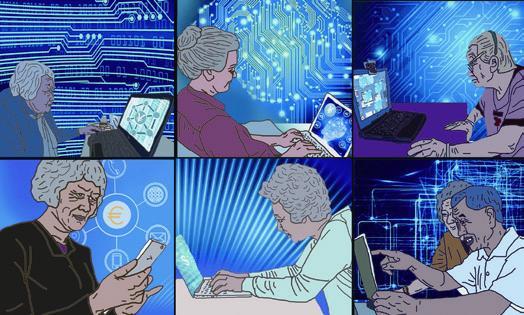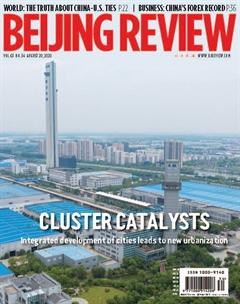How Do We Keep the Elderly Up With the Digital Era?

A video of an elderly person being stopped by railway staff in Dalian, northeast Chinas Liaoning Province, because he lacked a health code went viral online recently. But it wasnt the first time a senior was blocked from public transport during the prevention of the novel coronavirus disease for the same reason. While the code is playing a vital role in containing the spread of the novel coronavirus, these incidents reveal that some elderly people are unable to keep pace with the advancement of digital technologies.
China is now home to about 250 million people over 60 years, or 18.1 percent of the whole population. Although the Internet is more accessible, they still account for only 6.7 percent of Chinas 904 million netizens.
Most people believe these incidents point to the lack of consideration for seniors while designing public services and products, a problem amplifi ed by the pandemic. After all, citizens dont have a legal obligation to own or use smartphones, and rapid technological development is not supposed to make life difficult for those who cant keep up in the digital era.
Although it is unrealistic to stop the progress of science and technology, it is necessary to pay more attention to any group made vulnerable by modern technologies, especially the elderly.
Offering the elderly help
Liu Hongyu (www.rmzxb.com.cn): Today, people are increasingly required to pay fees, register with a hospital or withdraw money from banks over the Internet. They are even asked to subscribe to offi cial accounts or install an app before they can deal with some government departments. We cannot allow the elderly to keep struggling in our modern society. Science and technology development should not abandon seniors. They have the right to enjoy the rich cultural and convenient life that digital technology offers, instead of being squeezed out of social life.
To solve these problems, one answer is to offer training to the elderly on how to use smartphones, so that they can not only enjoy online services, but also chat and enjoy entertainment online. Community colleges for seniors can play a big role in this effort. In rural areas, it is necessary to offer lectures regularly so that the elderly can be informed about the latest features and apps on smartphones.
Moreover, government departments should have some volunteers to help the elderly do their business online. This practice is also suitable for banks, and water and electricity companies.
With a growing proportion of older people, its important for China to ensure convenience for this group in their daily life. Science and technology progress should not turn a blind eye to them.
Zhang Dianbiao (Xinhua Daily Telegraph): Nowadays, using the Internet for public services is an essential part of life. Nevertheless, some elderly people are cut off from services related to digital technologies due to their educational levels or environmental constraints. Even before the outbreak of the novel coronavirus disease (COVID-19), the digital gap already prevented many seniors from shopping or chatting online. Amid the outbreak, people are now asked to scan health codes before entering supermarkets, parks and railway stations, among other places. In short, digital technology has made seniors lives more inconvenient.
According to the 45th China Statistical Report on Internet Development, people above the age of 60 account for 6.7 percent of Chinese netizens. Today, the population over 60 stands at about 250 million, making the digital gap a big obstacle for a large number of people to enjoy the perks of advanced technologies.
Superfi cially, the health code is just a technical problem, but a deeper analysis reveals societys negligence of the elderly in designing public services and products. As a result, this group is becoming vulnerable in the intelligence era.
The younger generation can do something to help their grandparents. More importantly, society should show tolerance toward the elderly and give them some space to use old methods if they cant catch up fast enough.
Wang Hongfeng (www.rednet.cn): With the popularization of smartphones, its urgent for the younger generation to help their grandparents and other elderly people to familiarize themselves with smartphone features. While they enjoy the convenience and rich cultural life brought about by digital technologies, the young are also obligated to bring these benefi ts to the elderly.
In the intelligence era, those who dont know how to use smartphones are to some extent a new vulnerable group, being gradually marginalized. WeChat, mobile payment and navigation systems, among others, are a piece of cake for the youth, but are almost insurmountable for many elderly people.
The progress of science and technology is irresistible, but it doesnt necessarily mean that the elderly should be left behind. In the past, with the help of their grandparents, the young were able to learn a lot of things as children. Now, as their grandparents are getting older and risk being bypassed by modern technologies, its time for the young to return the kindness so that they can also enjoy the perks of digital technologies.
Though today most seniors dont need to worry about having enough food or decent housing or clothes, their ignorance of smartphones makes their life more diff icult. If young people could spare just minutes from playing on their own smartphones, they could do a lot to help their grandparents live a more comfortable life.

Reserving a slow-speed lane
Jin Fengjie (www.people.com.cn): While the intelligence era is bringing more and more convenience to society, it is not being well received by all people. During the COVID-19 outbreak, a lot of seniors were not allowed to enter supermarkets or take public transport, because they didnt have health codes.
However, advanced digital technologies should not be blamed for the inconveniences endured by the elderly. It is the negligence in not taking this group into account in the process of designing public services that has led to this embarrassing and helpless experience for so many senior citizens. Between efficiency and fairness, these designs lean totally toward the former.
The 45th China Statistical Report on Internet Development says that as of March 2020, about 496 million people are not using the Internet, either because they have no idea what it is or have a poor educational background. But no matter how fast modern science and technology is moving forward, China cant afford to neglect such a large group being left behind by the Internet. Therefore, people should be provided with other ways to prove their health status apart from scanning their health code. And while mobile payment is obviously prevailing, there should also be some room for paying in cash.
No one will be young or in the frontline of social fads forever, so social development should always take into consideration those who find it hard to keep up with the times. Seniors should be encouraged to keep pace with science and technology progress, but inevitably there are some in society who cant stay in step for various reasons.
Its great that some organizations have already taken action to help the elderly learn to use smartphones, such as talking on WeChat and connecting to wireless networks. This is a warm gesture against the cold backdrop of rapid artificial intelligence development.
Xia Yuanwang (Henan Daily): In China, about 500 million people dont know how to surf the Internet, while some elderly people dont even have a cellphone. Amid the pandemic, these people have found it diffi cult to go out and about. Thus, there must be more ways rather than just the health code on smartphone to help to control COVID-19.
There should be some opportunities for seniors in the fast-developing intelligence era. While society as a whole is benefiting greatly from the rapid development of digital technologies, a lot of elderly people are annoyed by these new technologies because they dont see their lives getting easier.
Their inability to use health codes is one of the many inconveniences they experience with modern technologies. Due to the complex remote control, some seniors seldom watch TV; online booking for bank services or medical treatment prevents them from visiting these places; some of them are confused by selfservice ticketing at railway stations.
The growing number of seniors in China requires society to pay more attention to this groups needs and evaluate whether they are capable of using the new products and public services that are being offered. They need to be cared for, rather than abandoned. For instance, sometimes services and products should be offered in the old-fashioned way because this is what a civilized society is obligated to do.

